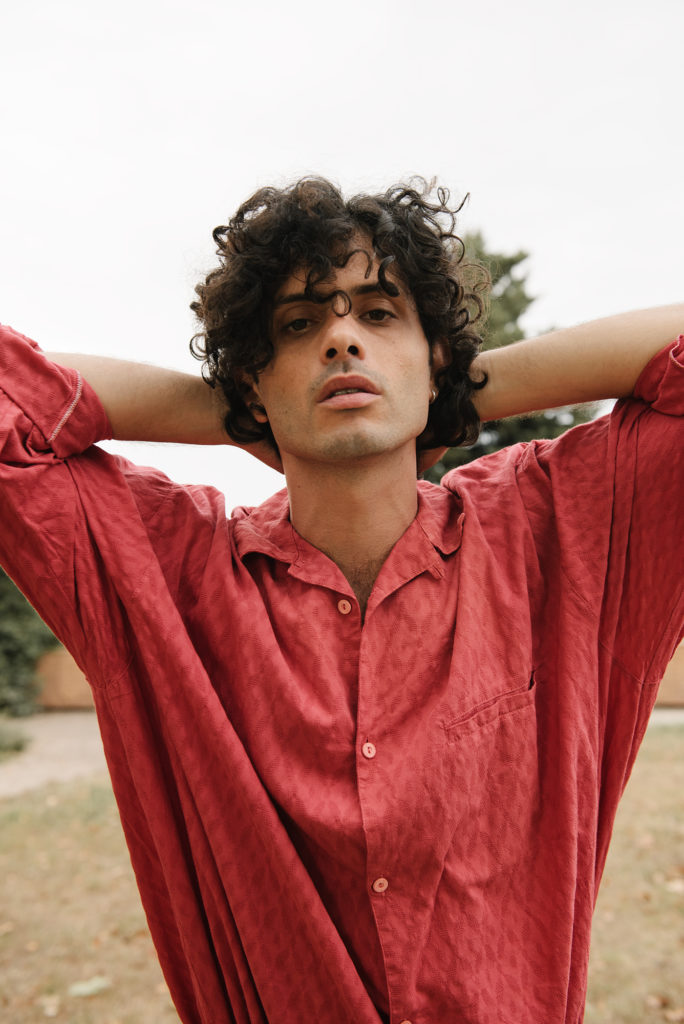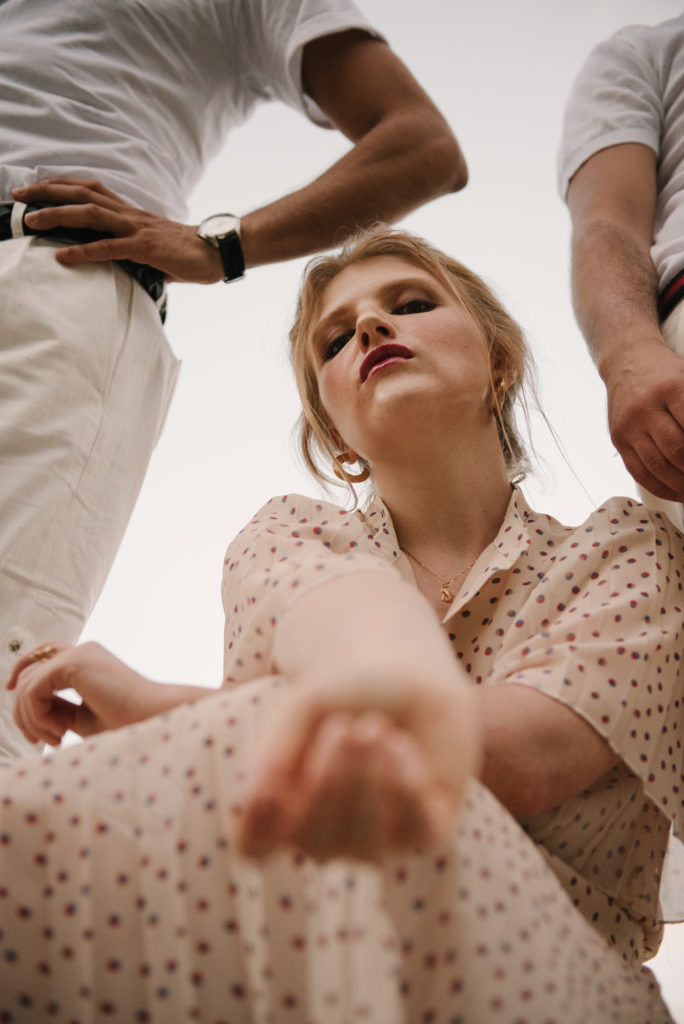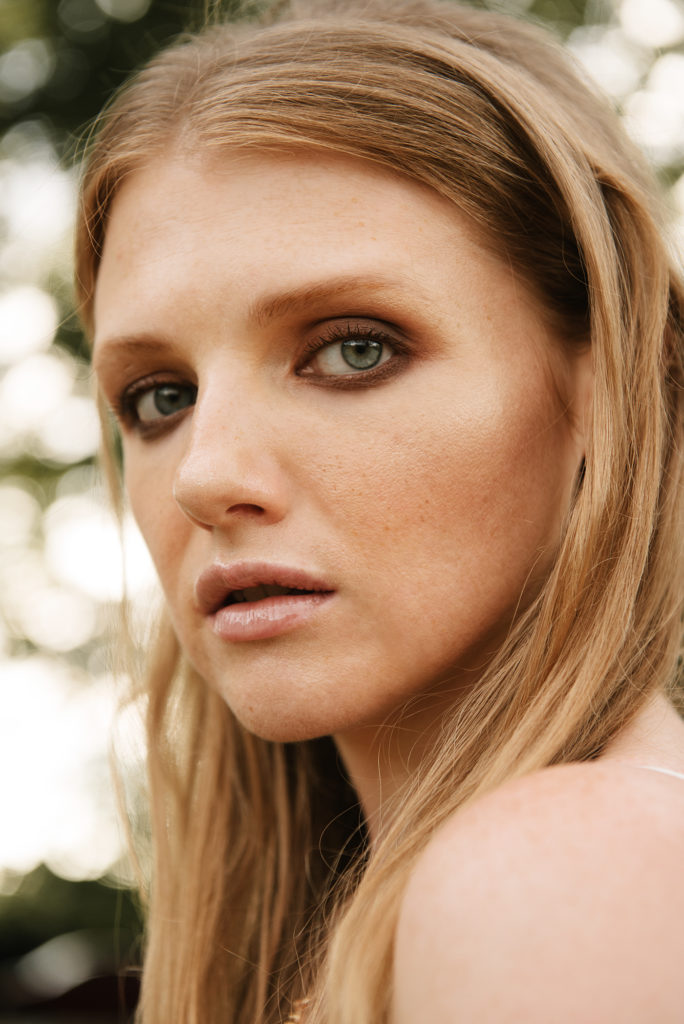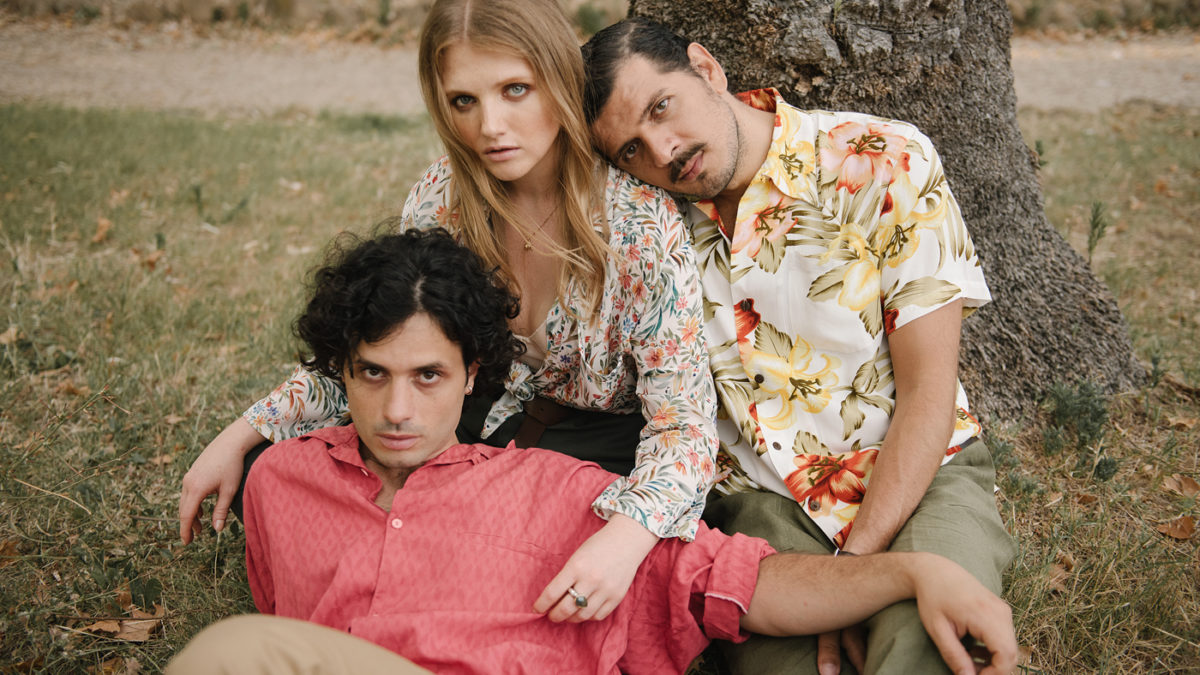Costellazioni d’autunno – Scelto tra più di duecento corti da Mov limited è il primo ad essere distribuito da Prime Video in Italia, USA e UK.
La storia è quella della relazione tra Amalia, una giovane cuoca sensibile e innamorata del suo lavoro e Marcello, un uomo più grande di lei che studia la fisica e si perde in mille domande.
Quattro autunni scandiscono le loro vicende e li segnano, irreversibilmente.
Costellazioni d’autunno è la prima sfida da regista per Marco Iermanò, premiato attore già diretto, tra gli altri, da Giuseppe Tornatore in Baarìa e Michele Placido in Il grande sogno. Per Costellazioni d’autunno ha voluto al suo fianco due attori e amici brillanti: Jessica Piccolo Valerani (Amalia), fresca di riprese in The New Pope di Sorrentino e Alessandro Carbonara (Marcello) che siamo impazienti di vedere nell’ultimo prodotto firmato HBO.
Arrivo al bar in cui abbiamo deciso di incontrarci, li raggiungo al tavolo, ci salutiamo, ci presentiamo, forse non si aspettavano fossi così giovane. Jessica e Alessandro ordinano un caffè, io un caffè con ghiaccio (me lo hanno portato senza ghiaccio), Marco ci pensa un pò, poi opta per un caffè. Quattro caffè. Chiedo:
Come vi siete conosciuti voi tre?
M: Ci siamo incontrati dieci anni fa, abbiamo frequentato la stessa scuola di recitazione qui a Roma; studiando sotto la guida di Gisella Burinato abbiamo avuto modo di conoscerci in profondità e ognuno si è portato dentro gli altri in tutti questi anni. Insieme avevamo già fatto un esperimento, avevamo lavorato ad un mio cortometraggio girato col cellulare, un’esperienza più “giovane”.
A: La visione di Marco è cambiata nel tempo: lì Jessica faceva la prostituta e io il prete e ora siamo diventati un fisico e una cuoca. Dalle stalle alle stelle (per rimanere in tema).
Più volte hai tenuto a sottolineare che tu sei un attore. Cosa rappresenta questo excursus da regista? È un modo per guardare la recitazione da un altro punto di vista? È una fase naturale della vita di un attore?
M: Sono cresciuto amando sempre e molto profondamente il cinema, con gli anni sono cambiate le esigenze: quando ero più piccolo avevo bisogno di usare i miei stessi strumenti e farmi guidare per “dire la mia”, così ho cominciato facendo l’attore; andando avanti col tempo, conoscendo la complessa “macchina del cinema”, non ho potuto fare a meno di innamorarmi di tutte le sue componenti. Al di là di questa esperienza la mia carriera da attore prosegue con entusiasmo, su Prime Video prossimamente uscirà un prodotto che mi vede protagonista. E comunque il regista è attore insieme agli attori: si serve di altre persone ma è lui stesso un attore. Le due figure non si possono separare, scindere. In questa mia opera prima è stato bellissimo potermi occupare di tutto, mettere del mio in ogni elemento.

A proposito di elementi mi ha colpito l’attenzione che hai riservato a ogni tassello: la forza dell’immagine della carota che viene sminuzzata è pari a quella dell’immenso cielo grigio del finale. Cosa sono questi dettagli? Perché senza di essi la storia non avrebbe funzionato?
M: Il fulcro della storia sono i due protagonisti. Le altre immagini servono a proiettare e descrivere i loro mondi, la potenza visiva di ciò che li circonda non è altro che la loro espressione.
J: I dettagli arricchiscono i personaggi: possono assecondarli o, in qualche modo, contrapporsi ad essi, in ogni caso ti aiutano ad arrivare vicino a loro. La scena delle carote ad esempio è fondamentale, ci parla della propensione di Amalia al controllo, alla minuzia, ci aiuta a descriverla senza parole. In questo film in particolare si spiega poco, si parla poco, quindi quei dettagli servono a stimolare i sensi di chi guarda, lasciandogli anche molta libertà.
A: Io credo sia un timbro, un segno stilistico di Marco. Nel mondo di Marcello c’è anche il suo cielo grigio, il suo spazio e io mi ci perdo: “il tempo non esiste”: è attorno a questo inciso che ruota il cortometraggio. Marco come regista è molto figurativo, va molto per immagini e così il cielo è Marcello, gli alberi sono Amalia.
Quanto è difficile raccontare una storia in quindici minuti? La durata del cortometraggio è un limite?
M: Non mi sono posto il problema, non mi sono detto “voglio fare un corto”, ma “voglio raccontare una storia”. Nonostante i limiti del tempo, mi sono sforzato di dare ricchezza ai personaggi non trascurando nulla di loro, curando ogni particolare. Ho avuto, permettimi di dirlo, dei veri talenti ai reparti e questo fa tanto!
J: Quando ci viene raccontata una storia spesso ci aspettiamo che qualcosa succeda e porti a un risultato. È questo che si scardina: non è importante cosa accade o come ciò avvenga, ma come il tempo maturi le cose. Quando vivi una cosa in quel momento per te è tutto.
A: Molte volte la mente viaggia per conto suo, prendi una storia d’amore: spesso ci si lega al tempo con l’idea che il rapporto debba per forza rispettare degli step e così accade che le storie non vengono vissute veramente perché non assecondano questa aspettativa. Anche un autunno solo, anche un periodo in cui non succede niente di segnante può essere travolgente, può distruggerti: il tempo non esiste perché quando due stelle, due entità si incontrano per la prima volta danno luogo a qualcosa che non esisteva prima, una cosa unica.
Non è facile misurare il tempo delle stelle e nemmeno quello della relazione tra Amalia e Marcello, ma non ci interessa come la storia si sviluppi, come nasca e come muoia, ci interessa che brilli.
M: Effettivamente l’obiettivo era fare questa similitudine tra il fuori e il dentro: siamo parte di un tutto, a me piace l’idea che Marcello nel film giri per casa facendosi delle domande: “chi sono?” Con lo stesso mistero con cui ci si può rivolgere agli astri, alle costellazioni, senza poter avere una risposta; mi affascina questo: l’idea che siamo sempre dentro una ricerca, un divenire.
Nella trama ci sono dei “buchi”, voi avete immaginato tutta la storia?
J: Io sì, avevo tutto chiaro. Forte del rapporto di amicizia profonda che mi lega a Marco mi sono permessa di tartassarlo: “mi devi dire che succede, me lo devi spiegare” ho avuto l’esigenza di capire tutto e l’ho ottenuto.
Anche perché il tuo personaggio in realtà è quattro personaggi diversi.
J: Esatto, sono quattro fasi e sono molto credibili perché effettivamente noi donne passiamo un momento tra i venti e i trenta anni in cui cambiamo davvero molto velocemente. Comunque io ho la mia versione della storia, ma mi piace l’idea che ciascuno si faccia la sua. Quando ho visto il montaggio definitivo mi sono chiesta cosa sarebbe successo ai fini della narrazione se alcuni gesti fossero stati diversi.

M: Scrivere per loro è stato bellissimo e ambizioso allo stesso tempo, sentivo di chiedergli molto, dovevano cercare delle cose che andavano al di là: Alessandro è più giovane del personaggio che interpreta e quello che ha tirato fuori ha stupito anche me, a Jessica ho chiesto di perdere un po’ della sua luce sul finale, doveva trasudare malessere, quasi irritare lo spettatore e devo dire che non tutte le attrici sono disposte a farlo. Le separazioni sono “lutti”, prima della rinascita si attraversa sempre una fase dolorosa, in cui spesso ci si carica di rabbia. E’ stato bellissimo poter lavorare su ciò che già conosco di loro in quanto amico e capire con loro ciò che ancora non conoscevo dei personaggi.
Come fanno i due personaggi a funzionare così bene insieme? La vostra energia mi ha colpito.
A: Dal mio punto di vista è stato grazie a un mix di elementi: da parte mia c’era un grande desiderio di aprirmi e questa apertura mi ha portato ad accogliere lei, andare verso di lei, dire “ok, sono qui”. Lui, Marcello è questo: “sono qui: conoscimi, sono qui”. Aperto. Il fatto che ci conosciamo da tanto ha alimentato la nostra complicità. Abbiamo molto rispetto l’uno dell’altro e sappiamo dove iniziano e finiscono le libertà dell’altro. Questo ci aiutato.
J: In genere sono abbastanza solitaria nelle mie preparazioni, mi devo chiudere e lavorare molto da sola, quindi in realtà il fatto che noi fossimo così amici e abituati a confrontarci è stato nuovo per me.
Sono stata fortunata a lavorare con lui, a studiare insieme a lui e a godere di un’intesa così alta. Nel film c’è una scena di sesso che non era prevista, o meglio, secondo me Marco l’aveva super-prevista, ma non l’aveva espressa. Comunque con Alessandro non ho avuto nessun tipo di problema, ci siamo lasciati andare.
Non amo fare domande sul futuro perché io non so mai rispondere, però credo che ogni volta che sperimentiamo qualcosa di nuovo siamo in grado di vedere meglio cosa vorremmo o non vorremmo contemplare per il domani. Che mi dite?
A: Vorrei trovare un regista che mi stia vicino come ha fatto Marco, che abbia la sensibilità di guidarmi e fami capire cosa voglia e si aspetti da me. Questi registi a volte capitano, ma spesso non capitano. Soprattutto in televisione, per le serie. Poi si, vorrei avere a che fare con persone che ti portino a lavorare in serenità, con piacere. È ciò che vorrei sempre.
J: Amalia è un personaggio molto strutturato: essere protagonista richiede una preparazione infinita, ma proprio questo è l’aspetto che mi piace e mi gratifica. Vorrei continuare a lavorare a questi livelli.
M: Io sto imparando che non ci si deve attaccare molto alle cose. Perché il tempo le trasforma e le cambia e le porta in altri luoghi…
J: Però è impossibile non attaccarsi alle cose.
Attaccarsi alle cose… Pensate che il cinema come lo abbiamo conosciuto noi sia destinato a morire?
M. Qualcuno dice che non esisteranno più i cinema perché ormai ci sono le nuove piattaforme che li supereranno. Io non sono dell’idea che qualcosa escluda qualcos’altro. Penso che ci sia una sorta di magia, una sacralità rispetto alla sala cinematografica che mi auguro con tutto il cuore rimanga tale. E comunque ho fede nei giovani: quando guardano al futuro in maniera genuina e positiva non c’è da avere paura. Basti pensare ai ragazzi del Cinema America.
J: A me la cosa che spaventa di più è il nuovo modo di fare condivisione: questa ansia di non annoiarsi, dover guardare cose che vanno veloci. Non si osserva. I nuovi mezzi hanno dei tempi molto rapidi, come se la comunicazione debba essere immediata e se, al contrario, si prende più spazio è difficilmente accessibile alla nuova generazione. Il cinema lo scegli e quando lo scegli decidi di dedicare il tuo tempo solo a quello. Non perdiamo la capacità di annoiarci, è nella noia che troviamo le risorse!
A: Secondo me, in tutte le cose della vita, esistono dei cicli: penso allo yoga, una disciplina molto antica che sembrava destinata a morire, ne hanno dichiarato la fine, invece guarda adesso come si è diffusa!
Un film che ognuno dovrebbe vedere? Illuminatemi.
J: Ci devo pensare un attimo, queste sono le classiche domande che ti mandano fuori di testa.
A: Il mio è un film al quale faccio riferimento spesso, quasi ritualmente. È un film vecchio, tragicomico, “Risate di gioia” con Anna Magnani e Totò.
J: Trovato! Magnolia di Paul Thomas Anderson. Sono più di dieci personaggi, un incastro di storie molto affascinante.
M: Io consiglio una carrellata dei film di Truffaut.
J: Ci vuole un’altra quarantena per la carrellata di Truffaut!

Le immagini inedite presenti nell’articolo sono state scattate da Valentina Cerulli (@valentinacerulliph) per The Walkman Magazine.
Stylist: Mirtilla Durante (@mirtilla_durante_archive)
Make up: Arianna Nota (@fotonota)
Hairstylist: Edgar (@edgar_hairdresser_rome)
Abbigliamento donna BeC (@becroma)
Abbigliamento uomo Brugnoli shop (@brugnoli_shop)
ENGLISH VERSION
Is there time for stars? Interview with the director and cast of Costellazioni d’autunno
Costellazioni d’autunno – Chosen among more than two hundred short films by Mov limited is the first to be distributed by Prime Video in Italy, USA and UK.
The story is the relationship between Amalia, a sensitive young cook and in love with her work, and Marcello, an older man who studies physics and gets lost in a thousand questions. Four autumns mark their events and mark them irreversibly.
Costellazioni d’autunno is the first challenge as director for Marco Iermanò, an award-winning actor already directed, among others, by Giuseppe Tornatore in Baarìa and Michele Placido in Il grande sogno. For Costellazioni d’autunno he wanted two brilliant actors and friends at his side: Jessica Piccolo Valeriani (Amalia), fresh from shooting in Sorrentino’s The New Pope and Alessandro Carbonara (Marcello) who we are eager to see in I May Destroy You, produced by HBO.
I arrive at the bar where we decided to meet, I join them at the table, we greet each other, we introduce ourselves, maybe they didn’t expect me to be so young. Jessica and Alessandro order a coffee, I order a coffee with ice (they brought me one without ice), Marco thinks about it a bit, then he opts for a coffee. Four coffees. I ask:
How did you three meet?
M: We met ten years ago, we attended the same acting school here in Rome, we had the opportunity to get to know each other in depth and each one brought the others in all these years. Together we had already done an experiment, we had worked on a short film of mine shot with a mobile phone, a “younger” experience.
A: Marco’s vision has changed over time: there Jessica was a prostitute and I was a pedophile priest and now we have become a physicist and a cook. From the stables to the stars.
Several times you have stressed that you are an actor. What does this director’s excursus represent? Is it a way to look at acting from another point of view? Is it a natural part of an actor’s life?
M: I grew up always and very deeply loving cinema, with the years the needs changed: when I was younger I needed to use my own tools and let myself be guided to “have my say”, so I started acting; going on with time, knowing the complex “cinema machine”, I couldn’t help falling in love with all its components. Beyond this experience my career as an actor continues with enthusiasm, on Prime Video will soon be released a product that sees me as the protagonist. Anyway, the director is an actor together with the actors: he uses other people but he is an actor himself. The two figures cannot be separated, split up. In this my first work it was wonderful to be able to take care of everything, to put mine in every element.
Speaking of elements, I was struck by the attention you paid to each element: the strength of the image of the carrot being chopped up is equal to that of the immense grey sky at the end. What are these details? Why would the story not have worked without them?
M: The core of the story are the two protagonists. The other images serve to project and describe their worlds, the visual power of what surrounds them is nothing but their expression.
J: The details enrich the characters: they can either go along with them or, in some way, oppose them, in any case they help you get close to them. The carrot scene for example is fundamental, it tells us about Amalia’s propensity to control, to minuteness, it helps us to describe her without words. In this film in particular, little is explained, little is spoken about, so those details serve to stimulate the senses of the viewer, leaving them a lot of freedom.
A: I think it’s a stamp, a stylistic sign of Marco. In Marcello’s world there’s also his grey sky, his space and I get lost in it: “time doesn’t exist”: it’s around this engraving that the short film revolves. Marco as a director is very figurative, he goes a lot for images and so the sky is Marcello, the trees are Amalia.
How difficult is it to tell a story in fifteen minutes? Is the short film’s duration a limit?
M: I didn’t ask myself the problem of time, I didn’t say “I want to make a short”, but “I want to tell a story”. The story was fine for a short film and, despite the time limits, I managed to create some very rich characters and maybe this is the strength of Autumn Constellations.
J: When we are told a story we often expect something to happen and lead to a result. That’s what gets unhinged: it’s not important what happens or how it happens, but how time ripens things. When you live something in that moment it’s everything to you.
A: Many times the mind travels on its own, you take a love story: often you are bound to time with the idea that the relationship has to respect steps and so it happens that the stories are not really lived because they don’t follow this expectation. Even a single autumn, even a period in which nothing happens can be overwhelming, can destroy you: time does not exist because when two stars, two entities meet for the first time they give rise to something that did not exist before, a unique thing.
It is not easy to measure the time of the stars and not even that of the relationship between Amalia and Marcello, but we are not interested in how history develops, how it is born and how it dies, we are interested in how it shines.
M: Actually, the goal was to make this similarity between the outside and the inside: we are part of a whole, I like the idea that Marcello in the film goes around the house asking himself questions: “who am I?”. With the same mystery with which one can turn to the stars, to the constellations, without being able to have an answer; I am fascinated by this: the idea that we are always within a search, a becoming.
In the plot there are fragments, have you imagined the whole story?
J: I did, I had everything clear. Strong of the deep friendship that binds me to Marco, I took the liberty to tartassarlo: “you have to tell me what happens, you have to explain it to me” I had the need to understand everything and I got it.
Also because your character is actually four different characters.
J: That’s right, they are four phases and they are very believable because we women actually spend a moment between twenty and thirty years in which we really change very quickly. Anyway, I have my own version of the story, but I like the idea of everyone doing their own. When I saw the final cut I wondered what would happen to the narrative if some gestures were different.
M: Writing for them was beautiful and ambitious at the same time, I felt I was asking a lot of them, they had to look for things that went beyond: Alessandro is younger than the character he plays and what he brought out surprised me too, I asked Jessica to lose some of her light on the ending, it must exude malaise, almost irritate the viewer and I have to say that not all actresses are willing to do it. The separations are “mourning”, before the rebirth one always goes through a painful phase, in which one is often charged with anger. It was wonderful to be able to work on what I already know about them as a friend and understand with them what I didn’t know about the characters yet.
How do the two characters work so well together? Your energy impressed me.
A: From my point of view it was thanks to a mix of elements: for my part there was a great desire to open up and this openness led me to welcome you, go towards you, say “ok, I’m here”. He, Marcello is this: “I’m here: meet me, I’m here”. Open. The fact that we have known each other for so long has fed our complicity. We have a lot of respect for each other and we know where each other’s freedoms begin and end. That helps us.
J: I’m usually pretty lonely in my preparations, I have to close up and work a lot by myself, so actually the fact that we were so friendly and used to each other was new to me. I was lucky to work with him, to study with him and to enjoy such a high level of understanding. In the film there is a sex scene that was not planned, or rather, I think Marco had super-expected it, but hadn’t expressed it. Anyway with Alessandro I didn’t have any kind of problem, we let ourselves go.
I don’t like to ask questions about the future because I never know how to answer, but I think that every time we experience something new we are able to see better what we would or wouldn’t like to contemplate for tomorrow. What about it?
A: I would like to find a director who is as close to me as Marco has been, who has the sensitivity to guide me and make me understand what he wants and expects from me. These directors sometimes happen, but often they don’t. Especially on television, for series. Then yes, I’d like to deal with people who will take you to work in serenity, with pleasure. That’s what I always want.
J: Amalia is a very structured character: being a protagonist requires endless preparation, but that’s what I like about it and it gratifies me. I would like to continue working at these levels.
M: I’m learning that you don’t have to get attached to things very much. Because time transforms them and changes them and takes them to other places…
J: But it’s impossible not to get attached to things.
To cling to things… Do you think that cinema as we have known it is destined to die?
M. Some people say that cinemas won’t exist anymore because there are now new platforms that will overcome them. I’m not of the opinion that something excludes something else. I think there is a sort of magic, a sacredness with respect to the cinema, which I hope with all my heart remains so. Anyway, I have faith in young people: when they look to the future in a genuine and positive way there is no need to be afraid. Just think of the guys at Cinema America.
J: What scares me the most is the new way of sharing: this anxiety not to get bored, having to watch things going fast. You don’t watch. The new means are very fast, as if communication has to be immediate and if, on the contrary, more space is taken up, it’s difficult for the new generation to access it. You choose cinema and when you choose it you decide to dedicate your time only to it. Let’s not lose the ability to get bored, it is in boredom that we find the resources!
A: In my opinion, in all things in life, there are cycles: I’m thinking of yoga, a very ancient discipline that seemed destined to die, they declared its end, but now look how it has spread!
A film that everyone should see? Enlighten me.
J: I have to think about it for a moment, these are the classic questions that drive you crazy.
A: Mine is a film that I often, almost ritually, refer to. It’s an old, tragicomic film, “Risate di gioia” with Anna Magnani and Totò.
J: Found it! Magnolia by Paul Thomas Anderson. It’s more than ten characters, a very fascinating mixture of stories.
M: I recommend an overview of Truffaut‘s films.
J: We need another quarantine for Truffaut’s movie!









